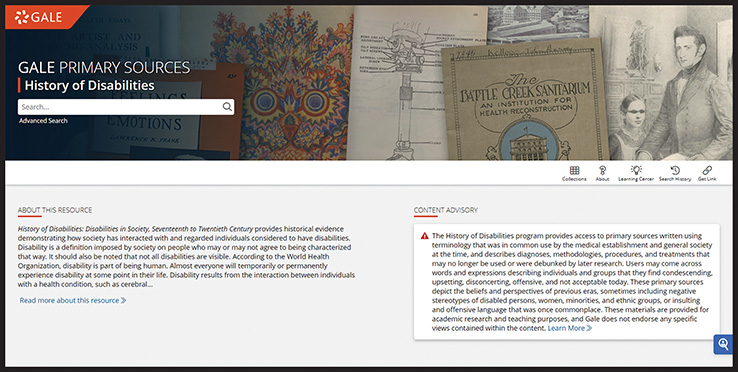History of Disabilities: Disabilities in Society, Seventeenth to Twentieth Century | eReviews
This unique Gale collection offers valuable materials about the perception of disability in the late 19th and 20th centuries.
History of Disabilities: Disabilities in Society, Seventeenth to Twentieth Century
CONTENT This primary source collection of historical documents, including manuscripts, books, and ephemera, provides a historical perspective on disability, activism, and advocacy. Materials include personal accounts and scientific and institutional historical documentation, such as policies and programs.
A content advisory on the home page explains the nature of the collection, recognizing that some of the historical language may be offensive to modern readers. The archive leans on Merriam-Webster’s definition of disability—“a physical, mental, cognitive, or developmental condition that impairs, interferes with, or limits a person’s ability to engage in certain tasks or actions, or participate in typical daily activities, and interactions”—as well as the list of impairments and limitations outlined by the U.S. Centers for Disease Control and Prevention and the dimensions of disability outlined by the World Health Organization.
Documents in the collection are sourced from five collections at the New York Academy of Medicine: the Alexander E. MacDonald Papers and Photographs, 1865–1906; Books About Disabilities from the New York Academy of Medicine Library; the Charles Loomis Dana Papers, 1876–1932; the Douglas C. McMurtrie Cripples Collection; and pamphlets about disabilities.
USABILITY The archive is intuitive, featuring a basic search box and access to advanced search options on the home page. A simple menu allows users to access the “Collections” page, “About” section, “Learning Center,” search history, and resource permalink. The five featured collections are searchable as a whole and can be filtered by content type, document type, and language. Researchers can also search within individual collections (filtering by document number, title, or date) or view all documents at a glance. An overview of the collection, description of the materials, and content advisory (where relevant) provide valuable insight into the research process. The advanced search page allows for searching across multiple queries and limiting by content type, date, collection title, subcollection title, document type, illustrated works, language, and source library.
The contents of the archive are high-res, text-searchable scans of original documents. A text-based transcript is included alongside the original document where relevant, and search keywords are highlighted in the document. A list linking to appearances of relevant keywords makes it easy to browse search results within a title. The OCR text for some handwritten materials is occasionally unclear, but that is to be expected with hard-to-read, stylized scripts.
Additional search tools include a topic finder and a term frequency tool. Users can also access citation tools, sharing options, and download and print options.
PRICING Starts at $11,734 with an annual hosting fee that starts at $102. Public library pricing is based on population served. Academic library pricing is based on full-time enrollment and other institutional variables. Institutions holding two or more Gale Primary Source collections receive complimentary access to the Gale Primary Sources cross-search platform. Potential customers should contact their Gale representative for current pricing and consortial purchase information. Free trials available upon request.
VERDICT Gale’s History of Disabilities is a unique collection offering valuable materials on the perception of disability in the late 19th and 20th centuries. An excellent resource for institutions supporting interdisciplinary research in history, health sciences, social studies, psychology, and disability studies.
RELATED
ALREADY A SUBSCRIBER? LOG IN
We are currently offering this content for free. Sign up now to activate your personal profile, where you can save articles for future viewing










Add Comment :-
Comment Policy:
Comment should not be empty !!!